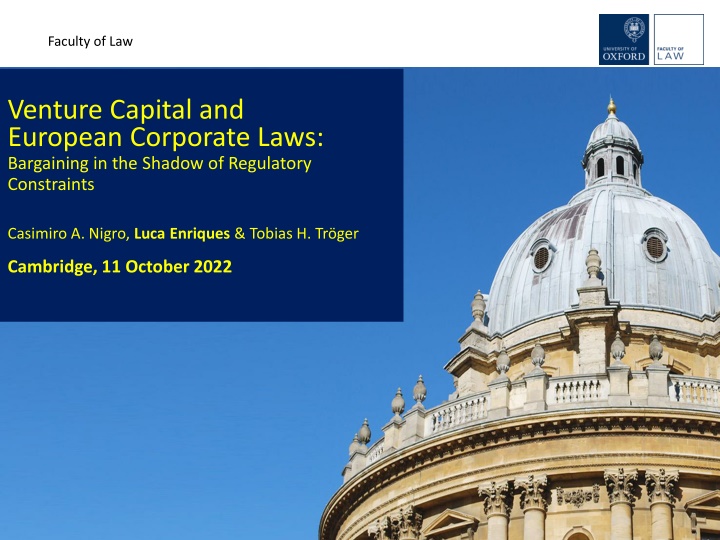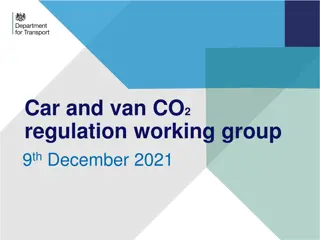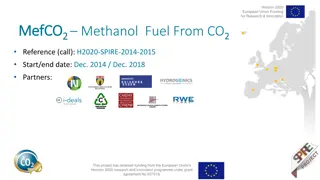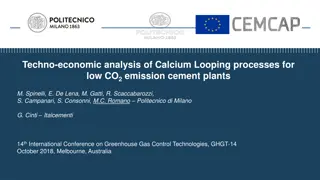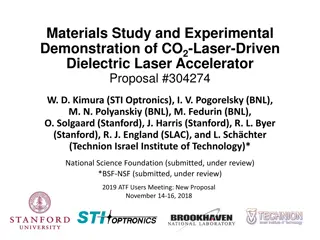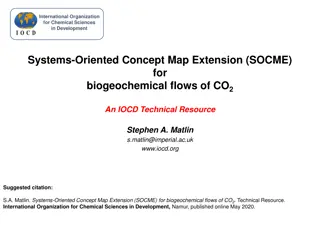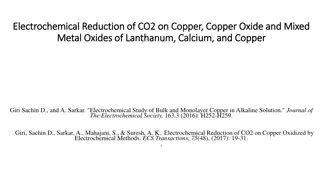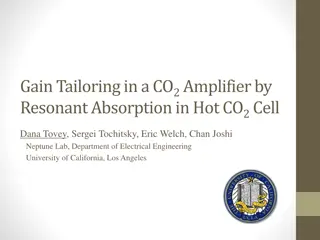Addressing Climate Change through CO2 Scrubbers
The Intergovernmental Panel on Climate Change (IPCC) plays a crucial role in assessing and providing scientific updates on climate change. The latest report highlights the impact of human activities on global warming and the urgent need for reducing CO2 emissions to prevent catastrophic climate scenarios. Achieving net-zero carbon emissions by utilizing CO2 scrubbers is imperative to mitigate climate change and safeguard the planet's future.
Download Presentation

Please find below an Image/Link to download the presentation.
The content on the website is provided AS IS for your information and personal use only. It may not be sold, licensed, or shared on other websites without obtaining consent from the author.If you encounter any issues during the download, it is possible that the publisher has removed the file from their server.
You are allowed to download the files provided on this website for personal or commercial use, subject to the condition that they are used lawfully. All files are the property of their respective owners.
The content on the website is provided AS IS for your information and personal use only. It may not be sold, licensed, or shared on other websites without obtaining consent from the author.
E N D
Presentation Transcript
Faculty of Law Venture Capital and European Corporate Laws: Bargaining in the Shadow of Regulatory Constraints Casimiro A. Nigro, Luca Enriques & Tobias H. Tr ger Cambridge, 11 October 2022
Roadmap Faculty of Law Research question: Do Italian and German corporate laws prevent US-style VC contracting? What do we know about the interrelation of VC markets and the institutions of corporate law and governance? Granular understanding of Italian and German corporate laws shows they are an impediment to US-style VC contracting Implications?
VC and institutions: the Law & Finance perspective Faculty of Law Literature on relationship btw institutional environment and VC markets, including influence of corporate law; among others: Jeng and Wells (2000): no significant correlation between LLSV indices and VC market development; but IPO markets hinge on corporate law quality Lerner and Schoar (2005): common law is better due to superior enforcement; Aggarwal and Goodell (2014): legal origins matter for their ability to deliver better investor protection. General (corporate) law quality seems to matter somewhat and indirectly (via better exit)
Faculty of Law VC and institutions: the irrelevance view Kaplan et al. (2007) analyze how the contracts allocate cash flow, board, liquidation, and other control rights [across jurisdictions]. [find] contracts differ across legal regimes. US style contracts are more typical in common law countries. However, there appear to be few institutional impediments to implementing US style terms. More experienced VCs are able to implement US style contracts regardless of legal regime. Private ordering solutions prevail in a Coasean bargain: seasoned VC firms (and entrepreneurs) can do whatever they want regardless of what corporate law stipulates (by default) For later: how about legal risk?
VC and corporate law: a more granular view on efficient contracting Faculty of Law Focus of standard L&F literature on general corporate law quality (as captured by indexes) may miss the pivotal variable in our context Corporate law matters as the background against which VCs and entrepreneurs structure their investment and governance relationship Relative (in)flexibility of corporate law affects contract design and therefore potentially has efficiency implications
Corporate law and VC contracting: shapeshifting Faculty of Law (US) Corporate law lays down default terms of the corporate contract contracting parties may reallocate cash flow- and control- rights to achieve a more efficient arrangement (re-)design of corporate contract causes shapeshift of the firm to achieve highest value structure for contracting parties Only mandatory core: duty of loyalty/good faith In VC-backed firms, shapeshifting stems from a complex private ordering exercise that: aligns organization and ownership of portfolio firms with VC fund (and entrepreneur s?) objectives paves the way to optimal portfolio diversification
Shapeshifting: means and tools Faculty of Law VC contracts allocate cash flow and governance rights on a contingent basis, separately one from the other and rely mainly on self-enforcing provisions. Most importantly, VC contracts have potential to quickly shift control to VCs and allow them to force ownership changes and even liquidation capture most, or even all, of the firm value if firm unsuccessful But entrepreneur shares in the upside and may even regain control if things go well
Corporate law flexibility as a precondition to shapeshifting Faculty of Law Private ordering exercise implies transaction costs (ex ante and ex post) Corporate law, if mandatory rather than enabling, affects magnitude of these costs by preventing the adoption of efficient solutions altogether Imposing inferior solutions depending on a country s legal culture, creating uncertainty as to the resilience of any clause At the margin, rigid corporate law can prevent deals and VC investment NB: no attempt to quantify negative cost effect No contradiction with observed VC boom in EU VC markets
VC contracting and US (DE) corporate law Faculty of Law US corporate law hospitable towards private ordering Flexible state contingent cash-flow and governance rights largely standardized & enforceable contracts. Courts respectful of contractual agreements Cash-flow rights Governance Exit Eg: Convertible Preferred Shares conversion liquidation preferences special dividends Unconverted CPS provide preferential fixed claim (amount invested + interests) Converted CPS provide pro rata residual claim on firm value Eg: Corporate Opportunity Doctrine Waivers COD does not apply for VC-appointed directors VCs as shareholders. Spares VC-appointed directors and VCs from obligation to inform firm about new COs they know about. Eg: Drag-along Rights Obligation to join in the sale of shares on the same terms Facilitates exit via trade/private sale
VC contracting and EU corporate laws Faculty of Law US contracting by and large conforms with financial contracting theory stable over time and across economic and credit cycles (Presumed) Efficiency implies that VCs and entrepreneurs around the world should mimic US-style contracts (other things equal) Indeed, observed in practice Do EU corporate laws prevent such piggybacking?
VC contracting and EU corporate laws Faculty of Law NB: 1. General trend at EU and national levels since mid-2000s: modernise institutional framework also to foster entrepreneurship, attract VC and support innovation 2. Local corporate law is only available product as a matter of practice, no Centros-land, no choice of corporate law, for VC! 3. Our focus is on German and Italian corporate laws, but we claim them to be indicative 4. We look at the law in action, as shaped by courts, legal scholars and practitioners
VC contracting and German and Italian corporate law Faculty of Law Financial Structure Governance Model Divestment Process Drag-along Rights provisions migrate to Europe entirely unchanged. Fair value constraint kills it Convertible Preferred Shares 1. Conversion rights clash with information function of the charter (GER) and very concept of corporation (ITA) 2. Liquidation preferences result in temporary fixed claim, incompatible with idea of shareholder status as such (ITA); must be fair (GER, ITA). 3. Automatic and cumulative dividends shareholders can receive dividends only from profits (GER, ITA [EU]), i.e. have no certainty about payouts COD Waivers loyalty is mandatory component of EU corporate laws waivers are no-go (GER, ITA) 12
Faculty of Law The Myth of Functional Equivalence Functional equivalence sometimes works, many times not, and sometimes is only formal Frequent disruption from national doctrines and standards, out of step with contemporary financial contracting Example: drag-along provisions in Italy For about 25 years, transactional practice consistent with international contracting following the US model Late 2000s: courts conclude that drag-along provisions are void if they do not feature fair value protections (i.e., recognizing an implicit appraisal right) Prompted changes to contractual practices Dramatic impact on investors perception of local institutional environment
Wrapping Up (1) Faculty of Law Can we replicate US-style VC contracts in Italy, Germany (Continental) Europe? Not really! Esp. clear if one painstakingly looks at the law in action Corporate law s inflexibility matters directly for VC contracting and affects both contract design and functionality VC contracts can be less valuable tools to structure investment relationships
Wrapping Up (2) Faculty of Law Strong orientation towards US model still (partially) observed: less costly than having tailor-made advice (esp. if uncertainty as to legality is high) second best (or better than nothing) when it comes to unsuccessful and contested transactions corroborates social norms in VC community and thus shapes behavior Litigation unlikely anyway Implications? At the margin this must affect VC investment: how thin is the margin? When the tide goes down For policy: given the source of constraints, flexibility-enhancing reforms require more than mere repeals and new, laxer rules
Faculty of Law THANK YOU!
